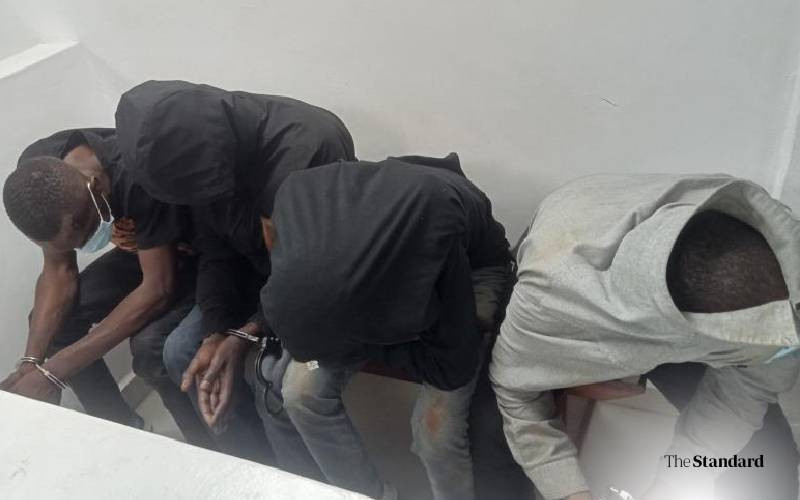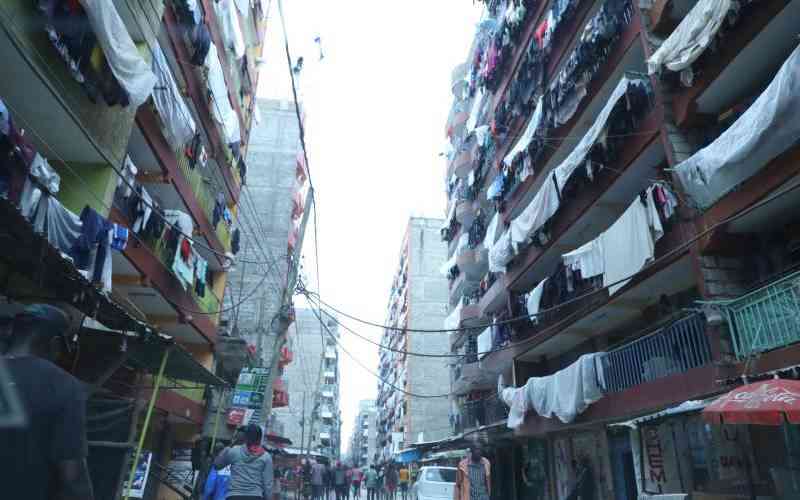Right suspects in court? How face masks, disguises threaten justice
National
By
Nancy Gitonga
| May 07, 2025

In a growing trend that has sparked national concern, a peculiar pattern is taking root in Kenyan courtrooms: suspects appearing in heavy disguises in hoodies, face masks, oversized sunglasses, and even Maasai lesos to obscure their identities.
What began as a Covid-19 precaution in 2020 has seemingly evolved into a deliberate strategy. Critics warn that this threatens the transparency and integrity of the judiciary.
From murder suspects to fraudsters, more accused individuals are stepping into the dock shrouded in layers of concealment.
While face coverings were once necessary during the pandemic, their continued use long after the lifting of mask mandates has raised urgent questions.
READ MORE
Why Nairobians are living in structurally unsafe houses
M-Pesa set for major system upgrade to enhance capacity
Why global ratings agency is doubting Mbadi's debt strategy
How illicit financial flows cost Kenya Sh243b annually
Banks ink Sh107b deal to fund Kilifi's special economic zone
Strategic Nest unveils 2025 Leadership Award Honorees
Graft, bureaucracy threaten Kenya's Gulf investment hopes, experts warn
Nairobi coffee auction fetch Sh1 billion
On Monday, four men arrested in connection with the assassination of Kasipul MP Ong’ondo Were concealed their faces in open court.
"I was told I would see him in court, but when I arrived, all I saw was a man in a hoodie, a face mask, and huge sunglasses. For all I know, that wasn’t even the person who attacked me," says Mary Wanjiku, a robbery victim who has attended court hearings for months without clearly seeing the suspect.
Wanjiku’s complaint echoes those of dozens of other victims who say the disguises not only deny them a sense of justice but also cast doubt on the identity of the people being prosecuted.
In the famous case involving TikToker Rish Kamunge, accused of scamming Kenyans out of millions through fake overseas job offers, she also appeared in court masked and hooded.
Victims voiced frustration at the police for allowing her to hide her face.
"This is unacceptable. We cannot identify the lady who conned us out of thousands of shillings, pretending she would get us jobs abroad. We demand she remove the mask," a group of victims shouted in court. Their pleas, however, fell on deaf ears.
In another case, Juliet Wakiuru Nduta (alias Waiguru) and Josphante Mogwambo Nyamwange were charged before Milimani Magistrate Robinson Ondieki with defrauding Mediquip Global Ltd of Sh14.8 million in a cooking oil deal.
They allegedly claimed they could supply cooking oil to the Regional Development department for Arid and Semi-Arid Lands. Both appeared in court masked, with lawyers standing beside them to shield them from press cameras.
Businessman Bruno Oguda Obodha, recently appointed by President William Ruto as Managing Director of East Africa Portland Cement Company (EAPCC), was charged earlier this week with multiple counts of forgery and fraud.
He, too, appeared in court masked, facing six charges before Mavoko Senior Principal Magistrate Derick Kuto.
Two weeks ago, a similar scenario unfolded when victims of a land fraud syndicate were unable to identify seven suspects, including Ministry of Lands employees, a Government Press official, and land brokers.
Among them were Dan Adero Okoth and Emmanuel Mutuku Matheka, accused of manipulating land records at Ardhi House.
They entered the dock completely covered in hoodies and masks, heads bowed to avoid being photographed.
With this trend, most victims fear that stand-ins may be taking the fall while real perpetrators walk free.
Sources within the court system and police allege that the disguises are often supplied not by the suspects themselves, but by lawyers, relatives, or even police officers, for a fee ranging between Sh200 and Sh1,000.
“We have seen some defense lawyers arriving with Maasai lesos, caps, and hoodies. Some argue their clients have health conditions and need to remain covered,” a court official, speaking anonymously due to the sensitivity of the matter, told The Standard.
At Milimani Law Courts, a new trend has emerged: defense lawyers standing beside the dock to shield suspects from media lenses. When journalists move in for a close-up, many lawyers step in quickly, even without any media restriction orders from the court.
Security checks meant to prevent such occurrences are often bypassed or weakly enforced, especially in crowded magistrate courts.
This persists despite a joint directive from the Inspector General of Police and the Chief Justice banning face coverings in court except on clear medical grounds. But enforcement remains inconsistent.
“We were instructed to stop anyone entering court in a hoodie or mask,” said a junior officer at Milimani.
“But when lawyers or senior officers insist, our hands are tied. Sometimes, even the judges don’t object.”
The controversy continues despite a circular issued on May 17, 2019, by former Chief Justice David Maraga, warning judges and magistrates across the country against allowing suspects to conceal their identities in court.
He said such allowances aided impunity. “The appearance of suspects must be clear and visible in court; this is essential for fair trials and the due process of law,” the circular stated.
In a memo to Judges, Magistrates and Kadhis, Maraga noted that allowing suspects to cover their faces with hoodies and dark glasses was aiding impunity.
"It has come to my attention that of late, suspects taken to court to face various criminal charges have taken to hiding their identity by wearing dark glasses or covering their faces with hoodies to make themselves unidentifiable.
"While the right to privacy must be respected at all times, the due process of the administration of justice may well be hampered if suspects in criminal matters are not easily identifiable and connected physically to the charges they are facing especially while taking a plea," he stated.
He directed the judges to exercise control of their courts to ensure they are not seen to be perpetuating impunity.
"I am aware that Muslim women who wear hijabs or burqas as well as other people who wear religious attire have routinely complied with court directions and have never sought to conceal their identities.
"While exercising your individual control of your courts, you must ensure that you are not seen to be perpetuating impunity, by allowing egregious behaviour by suspects, particularly when such behavior could bring the court to disrepute," Maraga directed.
Earlier on, Makueni Governor Mutula Kilonzo Jr questioned why suspects in the Kenya Revenue Authority (KRA) tax evasion case appeared in court wearing hoodies and sunglasses.
“How can a court allow this? When their names were called out, how did the magistrate confirm it was the accused?” the governor posed on X
Former Inspector General Japhet Koome echoed similar sentiments on February 26, 2024, during a speech in Mombasa.
Koome stated that individuals suspected of crimes should show up in court barefaced.
“It has gotten to a point that we need to think about these face masks and sunglasses that we are allowing suspects to wear in court; we need to see their faces in court," explained Koome
Koome further insisted that there ought to be a change in how the government conducts its operations, since it was not okay to have the suspects who are involved in serious crimes like drug trafficking, murder, and fraudsters conning Kenyans of millions of shillings who appear in court their faces fully covered.
According to the former Police boss, suspects should endure the shame of being presented in court for the alleged crimes committed.
In particular, Koome noted the case of four police officers from Kirinyaga County who were presented in court, charged with the sale of exhibit alcohol that resulted in the death of more than 17 people in the county.
Koome critiqued their action of covering themselves up, elaborating that the public should have seen their faces as a form of punishment for their alleged actions.
However, his directive by the officers who arraign suspects has never adhered to the said rules as the trend of suspects appearing in court across the country continues with impunity.
Still, the directives remain largely unenforced. On June 17, 2024, the Kenya Magistrates and Judges Association (KMJA) and the Kenya Judiciary Staff Association (KJSA) issued a joint statement supporting the ban on face coverings in court, citing growing safety concerns.
The statement followed the tragic shooting of magistrate Monica Kivuti at Makadara Law Courts. She was shot by Chief Inspector Samson Kipchirchir Kipruto, the OCS of Londiani Police Station, and later died at Nairobi Hospital.
They added that Kivuti's case is one amongst many that have seen the lives of judges being at risk as they have been attacked in courtrooms, and it would be proper for suspects and court users not to hide their faces.
Legal experts also point to the face hiding as systemic failure. “The directive exists, but without enforcement, it’s just ink on paper,” said lawyer Edwin Murage.
“While suspects have a right to a fair trial, the victims and public have a right to transparency. This trend undermines the principles of open justice.”
Perhaps most alarming is the growing suspicion that imposters could be taking the place of actual suspects.
“If a person remains fully covered throughout proceedings, with no clear process for confirming their identity, how can we be sure it’s really them?” asked lawyer Wanjiru Kimathi.

